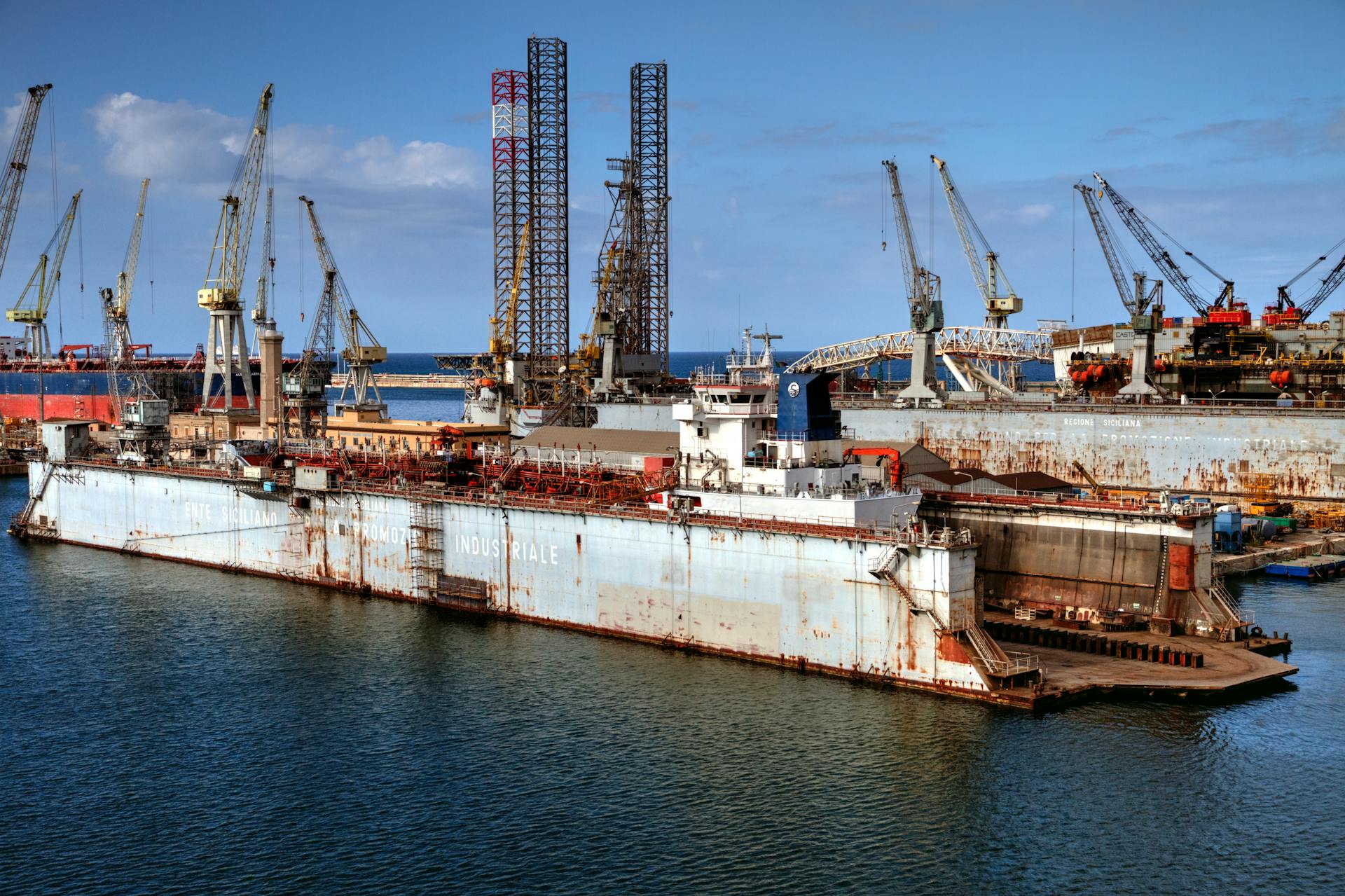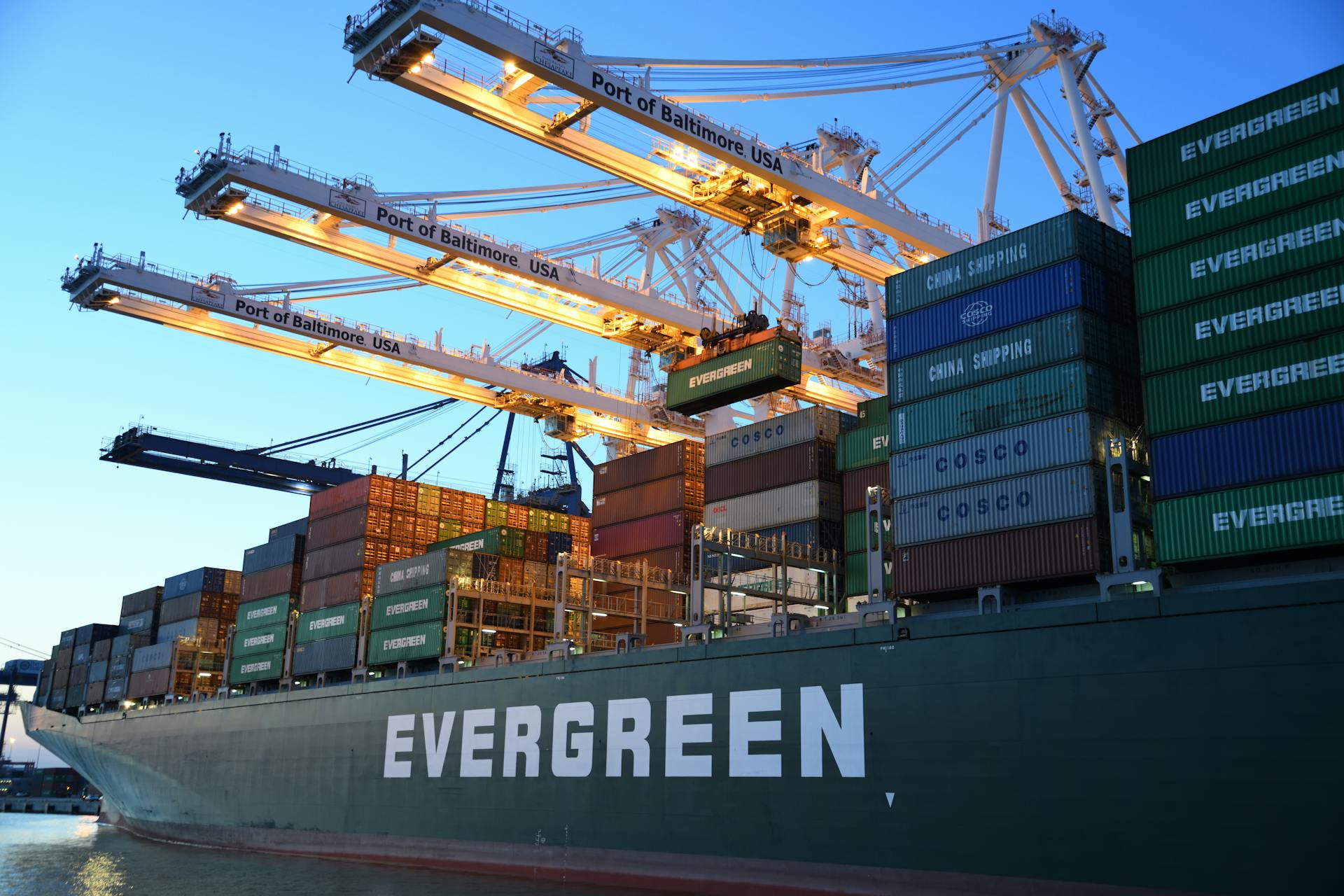
Green shipbuilders are leading the way in creating a more sustainable maritime industry. They're using innovative designs and materials to reduce fuel consumption and emissions.
One example is the use of wind-assisted propulsion systems, which can reduce fuel consumption by up to 20%. This technology is being implemented by companies like Norse Power, a Norwegian startup that's developed a system of rotating sails to harness wind energy.
Green shipbuilders are also focusing on energy efficiency, with designs that minimize drag and maximize cargo capacity. This includes using streamlined hulls and optimized propellers to reduce energy consumption.
These advancements are crucial for reducing the maritime industry's carbon footprint, which accounts for around 3% of global greenhouse gas emissions.
If this caught your attention, see: Garden Reach Shipbuilders & Engineers
Challenges in Decarbonizing Shipping
Decarbonizing shipping is a complex task, and several challenges stand in the way. One major obstacle is the lack of viable alternative fuels, with no clear frontrunner in the race to replace traditional fossil fuels.
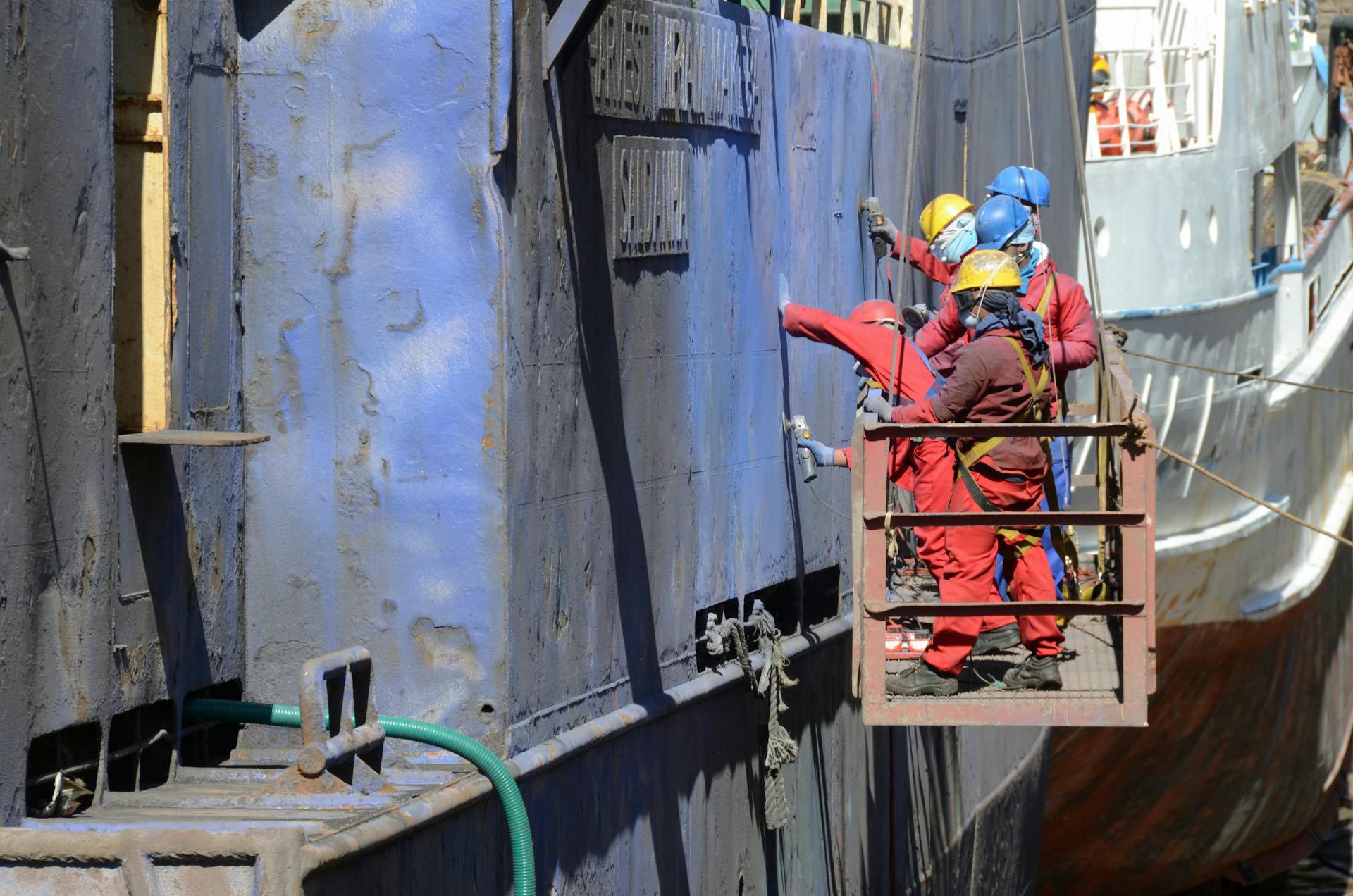
The shipping industry is hesitant to invest in new, advanced vessels due to the uncertainty surrounding how they will be fueled. This is because building a new ship is a massive endeavor that requires immense capital investment and takes around two to three years to complete.
Asset and infrastructure development are slow due to inadequate demand, making it difficult for shipbuilders and infrastructure developers to advance new technologies and build infrastructure that can accommodate future-ready vessels.
Uncertainties in regulations are another challenge, with carbon emission regulations advancing in regions like the European Union but lacking clarity on accountability. This has led to disputes between shipowners and traders, highlighting the growing complexity behind regulatory enforcement.
The global nature of shipping means that a unified industry effort is needed to prevent emissions from shifting from regions with tight regulations to those with less stringent measures. However, with too many stakeholders involved in each shipment, it's unclear who should be accountable for the carbon emitted.
The adoption of alternative materials, such as eco-friendly composites and non-toxic coatings, can reduce the harmful impact on the environment. However, the transportation impact of green materials, like green steel, can negate their sustainability benefits if they have to be transported long distances.
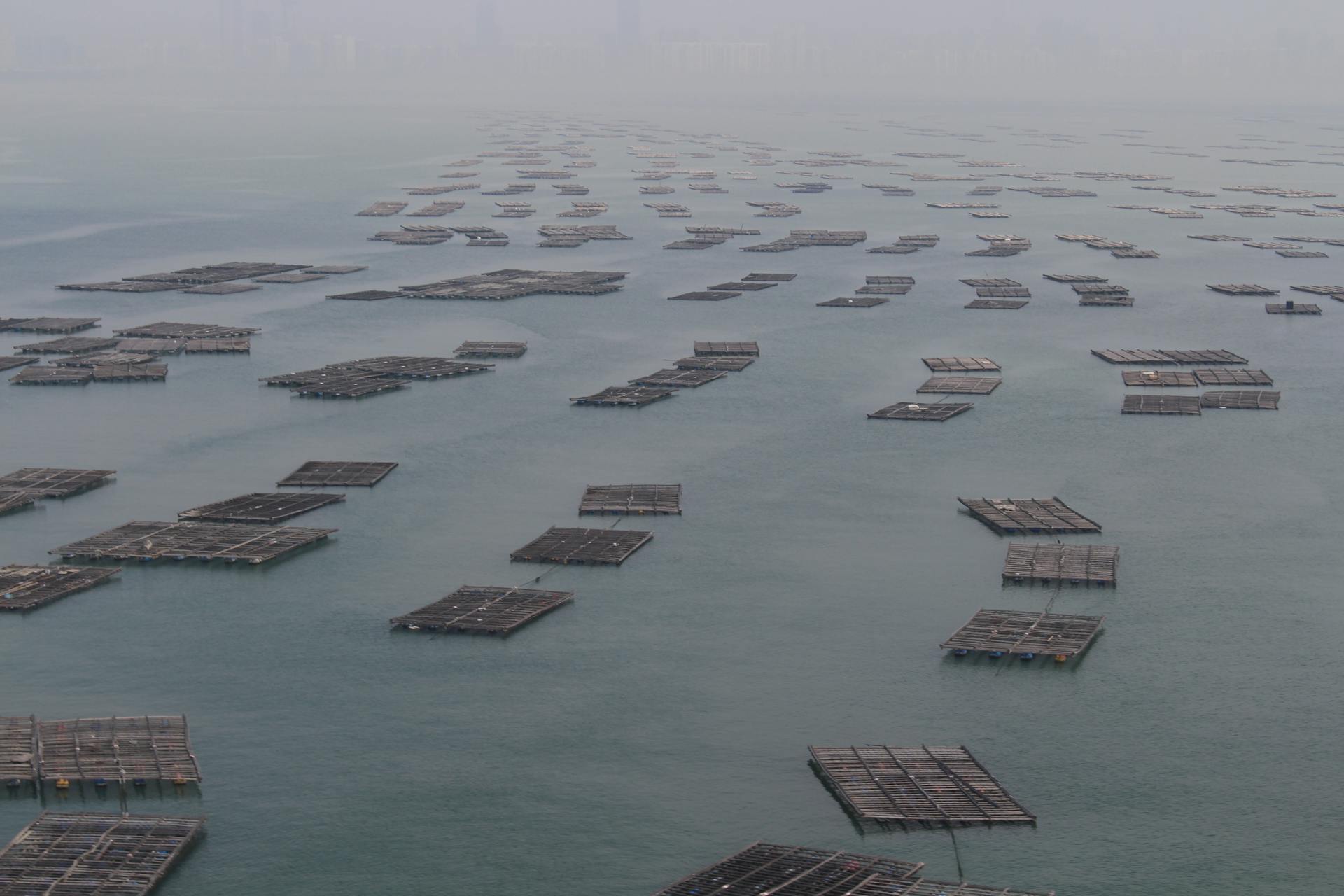
Damen's modular design is a strategy to manage the escalating complexity and rapid innovation in response to sustainability and advancements in propulsion technology. This design optimizes production processes, reducing the industry's overall footprint.
Green technologies are gaining traction in the maritime industry, including cleaner propulsion systems, energy-efficient designs, and the use of alternative fuels like methanol. Methanol presents a compelling sustainable alternative due to its potential to repurpose carbon emissions and its practical storage and handling capabilities.
However, challenges like engine availability and uncertainties regarding the carbon source for methanol fuels remain. These complexities highlight the industry's transition towards greener solutions.
Subsidies in the shipbuilding sector present a multifaceted challenge, inducing market distortions and contributing to overcapacity, diminished profitability, and financial strain. However, subsidies remain indispensable for advancing decarbonisation efforts, including in ship construction.
Achieving Change in Shipping
Breaking the gridlock in shipping requires a fundamentally different strategy, one that creates real change in one field and sparks progress in others.

Green ship technology is a central piece of the puzzle in achieving decarbonization, with 85% of emissions coming from deep sea ships.
At Hanwha, we believe in delivering disruptive yet economically feasible technical solutions in this field, with our subsidiary Hanwha Ocean dedicated to making it happen.
To generate demand for green ship technology, we've joined the World Economic Forum's First Movers Coalition and established a global shipping company with a new fleet of cutting-edge vessels.
These vessels will run on liquefied natural gas, methanol, and eventually ammonia and hydrogen, which don't emit carbon when burned as a fuel source.
We're also stepping up the development of ship digitalization, aiming to power vessels with fuel cells and electricity.
To build scale and momentum, we're collaborating with multiple stakeholders, including policymakers, customers, and research institutes, through our membership with the FMC.
However, mass adoption and commercialization of new technology require a concerted effort between the public and private sectors, as well as parties across the entire energy value chain.
Clearly defined global regulations will be crucial in building an ecosystem for change and scaling green vessels.
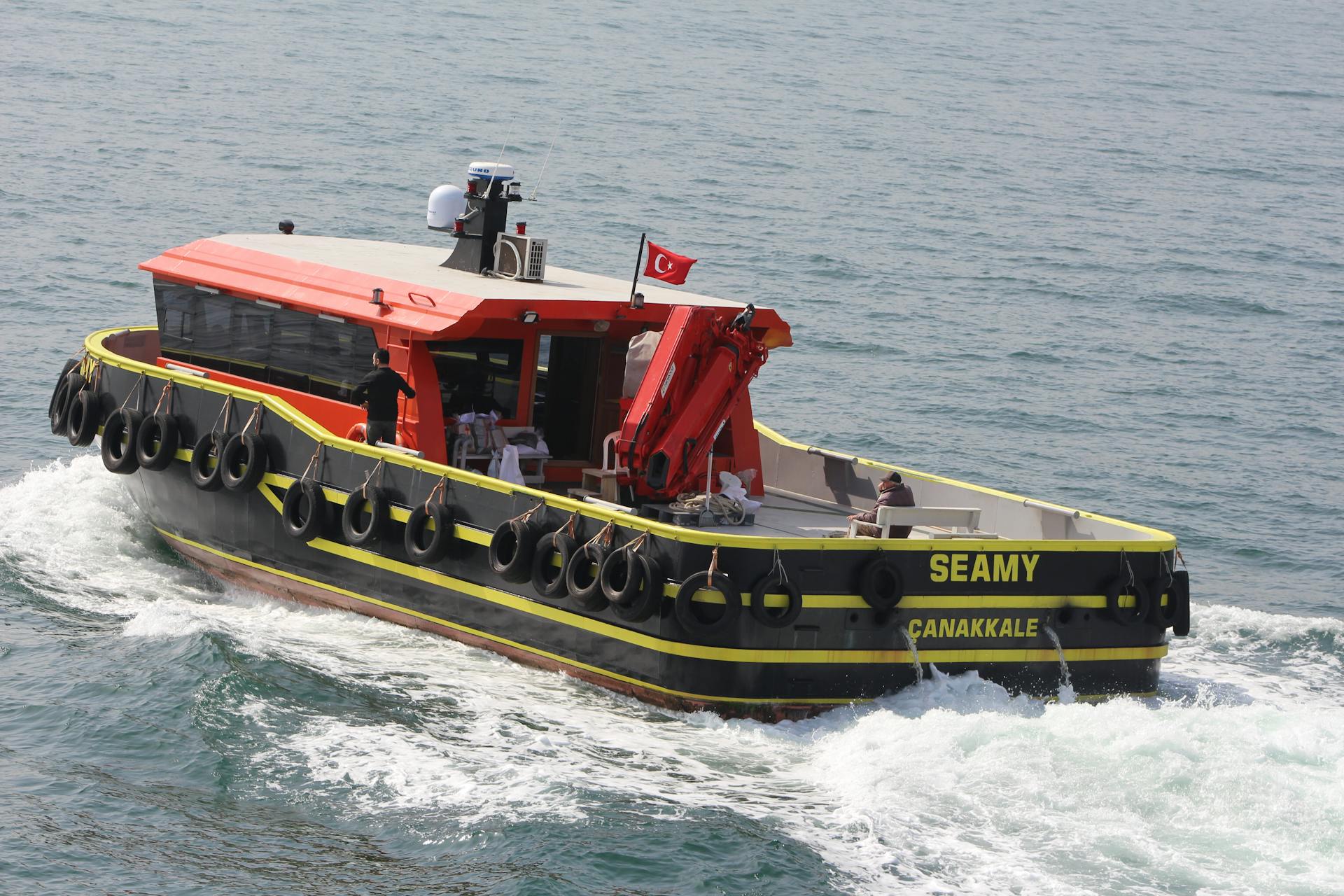
Big problems require bold solutions, and the shipping industry is no exception, with a singular driving force having a ripple effect and opening up new opportunities for many different parties.
The maritime sector has a responsibility to tackle climate change, and shipbuilders are rising to the challenge by introducing sustainable practices to reduce the carbon footprint of vessels throughout their life cycle.
Traditional shipbuilding often involves significant use of materials that require energy-intensive manufacturing processes and contribute to environmental degradation.
The adoption of alternative materials, such as eco-friendly composites and non-toxic coatings, can significantly reduce the industry's environmental impact.
Green steel is starting to gain traction in the industry, but its transportation impact is a concern, especially for shipbuilders operating globally.
Damen's modular design is a strategy to manage the escalating complexity and rapid innovation in response to sustainability and advancements in propulsion technology.
Green technologies are increasingly gaining traction in the maritime industry, including cleaner propulsion systems, energy-efficient designs, and the use of alternative fuels.
Methanol presents a compelling sustainable alternative due to its potential to significantly repurpose carbon emissions in the maritime sector.
However, challenges such as engine availability and uncertainties regarding the carbon source for these fuels remain, reflecting the complexities associated with the industry's transition towards greener solutions.
Autonomous and Sustainable Shipbuilding
The partnership between IRS and GRSE is a significant step towards fostering innovation and sustainability in the maritime industry. They've signed a memorandum of understanding to jointly develop autonomous and green energy vessels.
The collaboration aims to ensure that vessels designed and developed by GRSE comply with evolving safety standards, rule requirements, design specifications, and mandatory compliances for autonomous and green energy vessels. This will involve IRS providing guidance and expertise to GRSE.
GRSE has already made a move in this direction by launching a next-generation battery-powered electric ferry for the West Bengal government, which is being constructed under the IRS class. The ferry features an aluminium hull and a FRP superstructure.
IRS to Develop Autonomous Ships
The Indian Register of Shipping (IRS) is taking a significant step towards fostering innovation and sustainability in the maritime industry. They've signed a memorandum of understanding with Garden Reach Shipbuilders & Engineers Limited (GRSE) to jointly develop autonomous and green energy vessels.
IRS will provide guidance and expertise to GRSE in developing these vessels. This collaboration aims to ensure compliance with evolving safety standards, rule requirements, design specifications, and mandatory compliances.
GRSE has created a separate vertical for autonomous vessels and green shipping. This move highlights their focus on adapting to changing technology landscapes.
The partnership between IRS and GRSE emphasizes their commitment to promoting innovation and sustainability in the maritime sector.
Damen Shipyards Sustainable Shipbuilding Practices
Damen Shipyards is committed to becoming the most sustainable maritime solution provider in the world. They aim to reduce waste, energy needs, and increase the use of renewables for their energy.
The company has a Research, Development, and Innovation department that explores innovative solutions for green shipbuilding. Damen's modular design is a strategy to manage complexity and innovation in response to sustainability and advancements in propulsion technology.
Damen is exploring the use of eco-friendly composites, lightweight alloys, and non-toxic coatings to reduce the environmental impact of their vessels. They are also looking into the use of green steel, but note that it's not widely available and transportation costs can offset its sustainability benefits.
The company is also investing in alternative fuels, with a focus on e-fuels like methanol. Methanol presents a compelling sustainable alternative due to its potential to repurpose carbon emissions in the maritime sector.
Sustainable Ship Design and Lifecycle
The maritime industry is shifting towards sustainability, with a focus on reducing carbon emissions and environmental impact.
Shipbuilders are rising to the challenge by introducing sustainable practices in ship design and production.
Traditional shipbuilding involves significant use of materials, such as steel requiring energy-intensive manufacturing processes, which contributes to environmental degradation.
To tackle this, shipbuilders are adopting alternative materials like eco-friendly composites, lightweight alloys, and non-toxic coatings.
Damen Shipyards is using modular design to manage complexity and innovation in response to sustainability and advancements in propulsion technology.
Green technologies are gaining traction in the maritime industry, including cleaner propulsion systems, energy-efficient designs, and the use of alternative fuels.
One promising opportunity is e-fuels, with methanol standing out as a potential solution to re-use carbon emissions.
Methanol presents a compelling sustainable alternative due to its potential to significantly repurpose carbon emissions in the maritime sector.
Sustainable initiatives extend beyond fuel choices, encompassing smaller-scale movements like recycling ship parts and local waste reduction initiatives.
Damen Shipyards has engaged with local communities in Vietnam shipyards through initiatives like training programs and collaborative clean-up actions.
The maritime industry stands at the forefront of a transformative era, where sustainability is not merely a trend but a necessity.
Shipbuilders, naval architects, and industry stakeholders must collectively navigate the complexities of reducing environmental impact.
A unified strategy, bolstered by effective collaboration between governments and industry, is necessary to steer the maritime sector towards a sustainable horizon.
Maritime Decarbonization Efforts
The maritime industry is making significant strides towards reducing its environmental impact, and it's exciting to see the progress being made. Damen Shipyards is a great example of this, with their commitment to sustainability and circular economy practices.
They're not just focusing on fuel choices, but also on recycling ship parts, reducing local waste, and prolonging the life cycle of ship materials. This approach is essential for minimizing the industry's footprint.
The OECD is also playing a crucial role in maritime decarbonization, recognizing the need for actionable strategies to address technological advancements, fuel options, and better collaboration across sectors. They've even renamed their Council Working Party on Shipbuilding to the Shipbuilding Committee to focus on decarbonization.
The industry is at a critical juncture, and it's essential to adopt a targeted, unified strategy to steer the maritime sector towards a sustainable horizon. This requires effective collaboration between governments and industry, as well as a commitment to innovation and transparency.
Decarbonization Challenges and Commitments
South Korea's shipbuilding industry is accelerating its efforts to build green ships using eco-friendly fuels.
The profitability of eco-friendly vessels is up to 1.5 times higher than traditional counterparts thanks to green fuels.
HD Hyundai's hydrogen fuel engine is a game-changer, ensuring less toxic gas emissions and minimizing the loss of hydrogen by reusing evaporated hydrogen emissions in ship operation.
Daewoo Shipbuilding & Marine Engineering is committed to developing greener ships with three energy-saving technologies, including a rotor sail system that generates power using wind and column rotation.
The industry expects orders for eco-friendly ships to increase due to the International Marine Organization's stricter regulations on vessel carbon emissions.
Samsung Heavy Industries Co. has obtained Approval in Principle for a new ammonia propulsion carrier, a significant step towards making green vessels mainstream.
Green vessels are expected to save fuel by about 5 percent with an engine's rotational power and air lubrication system, and an additional 5 percent with a rotor motor, equivalent to energy saving up to 5 billion won ($3.91 million) a year per ship.
The shipbuilding industry is committed to decarbonization, driven by the need to reduce carbon emissions and meet international regulations.
Unified Vision and Industry Trends
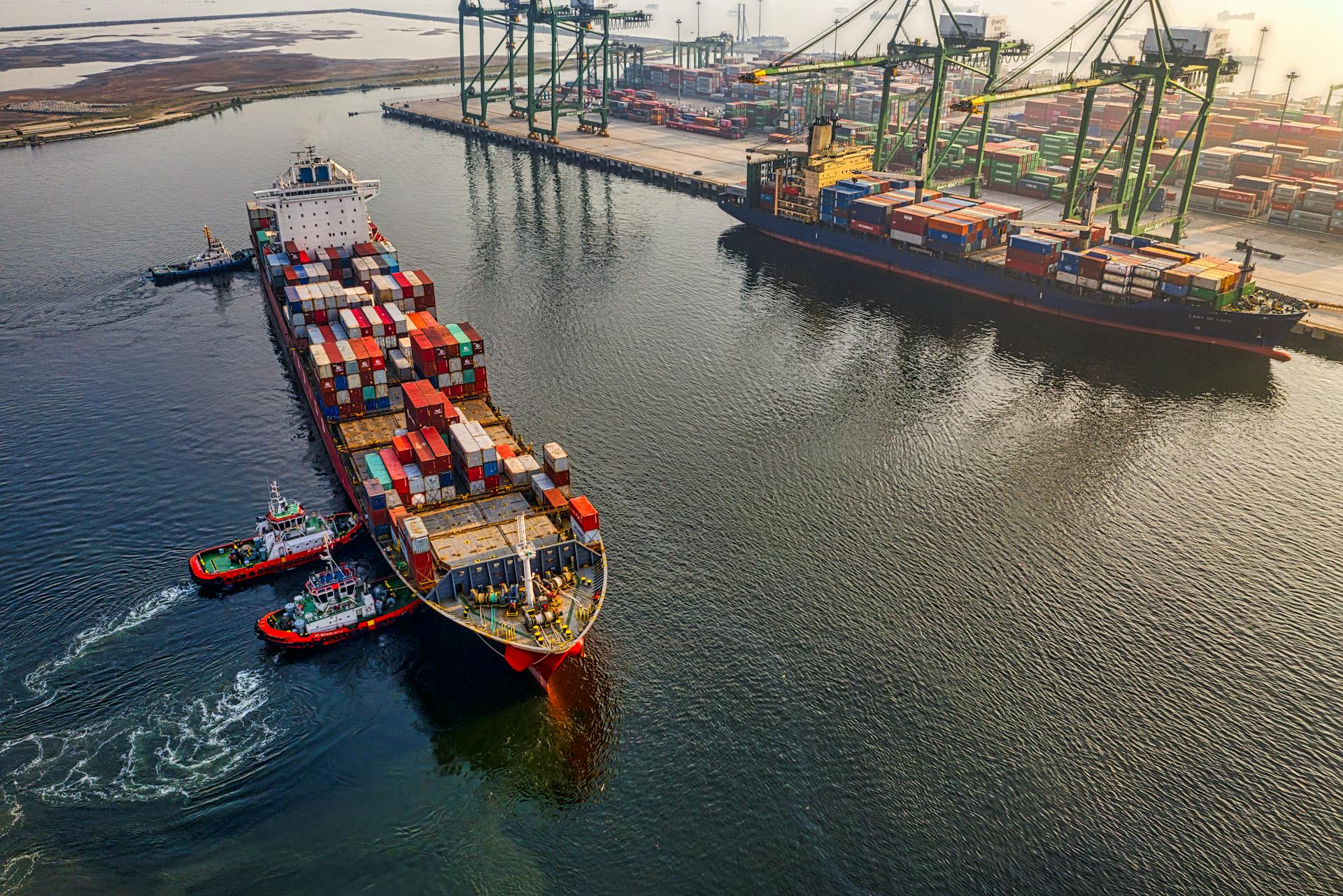
The maritime sector is at a critical juncture, requiring a unified vision to navigate the challenges of decarbonisation. Shipbuilding is the intersection between this vision, global trade, and cutting-edge technology.
A targeted, unified strategy is essential for success, and governments and industry must collaborate effectively to make it happen. The time to act is now, as the maritime sector needs to be steered towards a sustainable horizon.
Sources
- https://www.hanwha.com/newsroom/news/feature-stories/decarbonization-of-shipping-an-ambitious-global-test-bed-for-green-ships-sets-sail.do
- https://www.offshore-energy.biz/irs-grse-to-jointly-develop-autonomous-and-green-ships/
- https://platformzero.co/green-shipbuilding-with-damen-shipyards/
- https://oecd-environment-focus.blog/2023/12/11/charting-a-course-to-net-zero-the-crucial-role-of-shipbuilding-in-greening-the-maritime-sector/
- https://www.hellenicshippingnews.com/south-korean-shipbuilders-bet-big-on-green-fuels/
Featured Images: pexels.com

